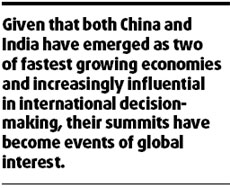Singh's visit expected to build on positive vibes
Updated: 2008-01-11 07:23
Assessments about Delhi's winter fog are making Indian Prime Minister Manmohan Singh begin his sojourn to China earlier than expected. His flight will arrive in Beijing early on Sunday morning rather than late in the evening. He will use this additional time to acclimatize to Beijing's chill, and to scale the Great Wall.

Attempts are also being made for him to address one more business meeting, a turf that this professor of economics may find far more familiar to deal with. But even here, his challenges of outlining his vision remain formidable to say the least.
Given that both China and India have emerged as two of fastest growing economies and increasingly influential in international decision-making, their summits have become events of global interest. But then this also puts a premium on making each such visit a breakthrough event.
However, despite their rapid rise, the whole understanding of "breakthrough" in China-India relations has come to be narrowly defined in terms of progress made in their boundary negotiations. And recently, their border talks seem to have lost both urgency and momentum and are now viewed in "strategic" terms.
The special representatives format for border talks set up during the last visit by then Indian prime minister Atal Bihari Vajpayee in June 2003 had picked up speed by signing an agreement on general principles and outlining drafts for a second framework agreement in their nine rounds in first three years.
The two sides have tried hard to inject some enthusiasm and early last year the two sides had even set up an experts group to assist the special representatives. But this has not shown results so far. The Indian foreign minister last week admitted that this summit is not expected to achieve any "dramatic turnaround" in their boundary negotiations.
Meanwhile, camouflaging this slowdown of their boundary negotiations, the officials from both sides have continued to deflect the focus to their economic engagement. But again this most happening arena of their relationship has also increasingly become an enigma confounding both our economists and politicians at the same time.
First, political leaders have repeatedly failed to keep tab on the pace of their bilateral trade trends. Their bilateral trade has moved 2.6 times up in the last four years since the last visit by an Indian prime minister.
Second, these impressive statistics of bilateral trade continue to defy the fundamental economic logic and has not moved from trade to investments. Though the last decade has witnessed Indian companies mushrooming across China, China's investments in India have remained stagnant.

Among other systemic hiccups, India's security concerns remain a stumbling block.
Third, while India prided itself as being one of the most balanced trade partners of China, it increasingly faced exports sliding into deficit with China.
Fourth, even in the face of Indian exports failing to keep pace with China's exports to India, this relative imbalance in their trade remains vulnerable to half of India's exports being of one commodity, for instance, iron ore.
This skewed nature of India's export basket also remains under a cloud for making no value addition to this primary source, and is subject to limitations as this export cannot be expanded any further.
Contributions by India's services sector have shown impressive growth trends yet remain only marginal to their overall trade.
Fifth, this apparent trade boom and their continued "peace and tranquility" on their border regions has also failed to show any impact on their border trade which continues to hover at around a meager $1 million with seasonal swings.
The hype surrounding the opening of the third border trade route through Nathu La in Sikkim has also subsided gradually. This has put question trade being the strongest pillar of their confidence building approach to their political relationship.
The picture of course also has a few new silver linings. Past decades had witnessed an exclusive domination by a small group of linguists and military and civilian officials with postings to China or the China border - mostly with negative experiences and feelings.
Today, an increasing number of businessmen, students and other tourists are visiting China. They all have strong positive views favoring closer links with China, and also for learning lessons from China. But the Indian prime minister is not scheduled to address the Indian community in Beijing.
Apparently, much more still remains to be done. There is particularly need for expanding mutual tourism and other regular exchanges. During the year 2007 that was designated as the Year of China-India Friendship, India received less than 100,000 of 35 million Chinese travelers abroad for that year.
On the eve of the prime minister's visit, the Indian embassy has reportedly overhauled visa collection and delivery both by outsourcing and internally reorganizing.
As part of these symbolisms, the two prime ministers will attend the commemoration of the 70th anniversary of Dr Dwarkanath S. Kotnis' arrival in China in 1938 and launch the establishment of a joint medical team put together by the Indian Council of Cultural Relations and the Chinese People's Association for Friendship with Foreign Countries - each providing 10 doctors.
This team will provide free medical treatment and conduct other charity activities in both countries thereby strengthening each other's positive perceptions.
This summit, accordingly, comes about three weeks after their much-awaited anti-terrorism joint-military exercises in Kunming, Yunnan Province.
Last year also witnessed their third Strategic Dialogue between Foreign Secretary Shiv Shankar Menon and Vice-Foreign Minister Wu Dawei and the 11th round of Special Representatives' border talks in Beijing.
October last year had the much-discussed high-profile visit to China by Chairperson of United Progressive Alliance Sonia Gandhi and her son Rahul Gandhi. Meanwhile, Premier Wen Jiabao and President Hu had visited India respectively in April 2005 and November 2006.
Given the focus of the visit being on expanding economic engagement, leading lights of India's business organizations, including representatives of the Confederation of Indian Industry and the Federation of Indian Chambers of Commerce and Industry, are part of the Indian prime minister's team.
Between them, these industrialists straddle diverse sectors including information technology, automobiles, petrochemicals, media, pharmaceuticals, engineering and telecommunications. A 40-odd-member business delegation will interact with more than 400 Chinese businessman and officials.
China signed a Memorandum of Understanding for civilian nuclear cooperation during President Hu's visit to New Delhi during November 2006, it has made this amply clear that it will not stand in India's way.
Both leaders are expected to discuss prospects of civilian cooperation, especially Beijing's active support to India seeking a waiver at the 45-nation Nuclear Suppliers Group.
Indeed, on future issues their enhanced cooperation and dialogue in areas like counter-terrorism and climate change will be part of their deliberations where agreements and joint strategies are likely to emerge much more easily.
The author is associate professor with the School of International Studies, Jawaharlal Nehru University, New Delhi
(China Daily 01/11/2008 page9)
|
|
|
|
|
|